



If you find yourself wandering through Kota Administrasi Jakarta Pusat,you’ll immediately notice the pulse of a city that’s both historic and buzzing with modern energy. It’s a place where colonial-era buildings stand shoulder to shoulder with sleek skyscrapers,creating a fascinating blend of old and new. Walking down the streets,you can almost hear the echoes of history mingling with the chatter of office workers and street vendors. The air carries a mix of aromas—from the rich,spicy scent of street food stalls grilling satay to the faint,comforting smell of freshly brewed kopi from tiny warungs tucked in corners. What really makes Jakarta Pusat special is its vibrant character. It’s the heart of the city’s administrative and cultural life,so you’ll find a lively mix of people—government officials,artists,students,and families—all weaving their stories into the urban fabric. The bustling markets,like Pasar Baru,invite you to haggle over colorful textiles and local snacks,while nearby museums and galleries offer a quiet retreat into Indonesia’s rich heritage. There’s a rhythm here that’s both fast-paced and inviting. Whether you’re sipping a sweet es cendol under the shade of a tree in Merdeka Square or catching the golden light reflecting off the National Monument at dusk,Jakarta Pusat feels alive in a way that’s deeply human and endlessly fascinating. It’s a city that invites you to slow down,look around,and soak in the layers of life unfolding all at once.
The information on this page is currently being reviewed by Tripkliq and should be used as a guide only
Eng word: Hello
Eng pronunciation: HAH-loh
Local language: Halo
Eng word: Goodbye
Eng pronunciation: suh-LAH-maht TING-gahl
Local language: Selamat tinggal
Eng word: Thank you
Eng pronunciation: teh-REE-mah KAH-see
Local language: Terima kasih
Eng word: How much
Eng pronunciation: buh-RAH-pah
Local language: Berapa
Eng word: Toilet
Eng pronunciation: TOY-let
Local language: Toilet
Eng word: Help me
Eng pronunciation: TOH-long SAH-yah
Local language: Tolong saya
Eng word: Yes
Eng pronunciation: YAH
Local language: Ya
Eng word: No
Eng pronunciation: TEE-dahk
Local language: Tidak
Eng word: Excuse me
Eng pronunciation: puhr-MEE-see
Local language: Permisi
Kota Administrasi Jakarta Pusat, once known as Batavia during colonial times, served as the de facto capital of the Dutch East Indies. Founded in 1619, it played a crucial role in the spice trade, becoming a vital center of commerce and administration.
The National Monument, or Monas, located in the heart of Jakarta Pusat, symbolizes the fight for Indonesia's independence. Completed in 1975, it stands as a beacon of nationalism and pride for the Indonesian people.
Istiqlal Mosque, inaugurated in 1978, is the largest mosque in Southeast Asia and represents the Islamic faith of Indonesia. Its construction was meant to commemorate Indonesian independence and stands opposite the Jakarta Cathedral, symbolizing religious harmony.
The Jakarta Cathedral, officially known as the Cathedral of Our Lady of the Assumption, is a landmark Roman Catholic Cathedral inaugurated in 1901. Its neo-gothic architecture contrasts with the neighboring Istiqlal Mosque, reflecting Indonesia's religious diversity.
Fatahillah Square, located in the old part of the city, is surrounded by historical buildings that date back to the colonial era. It is a popular spot for both locals and tourists, offering a glimpse into the city's rich historical past.
The Bank Indonesia Museum, situated in Jakarta Pusat, showcases the country's financial history, including its evolution and role in the spice trade. The museum occupies a historic building that once served as the head office of De Javasche Bank during the Dutch colonial period.
Located in the Old Town (Kota Tua) area, the Jakarta History Museum is housed in the former City Hall of Batavia. It chronicles the city's evolution from prehistoric times through the colonial era and into the modern age, offering invaluable insights into its diverse history.
Gedung Kesenian Jakarta, also known as the Jakarta Art Building, is a historic theater built in the 19th century. It has hosted a variety of performances and cultural events, playing a significant role in the development of the arts within the city.
Merdeka Square, one of the largest squares in the world, is an iconic open space in Jakarta Pusat. It's surrounded by important landmarks including the Presidential Palace and Monas, making it a focal point for national celebrations and events.
In Kota Administrasi Jakarta Pusat, the most common Power Adaptor is C, F.


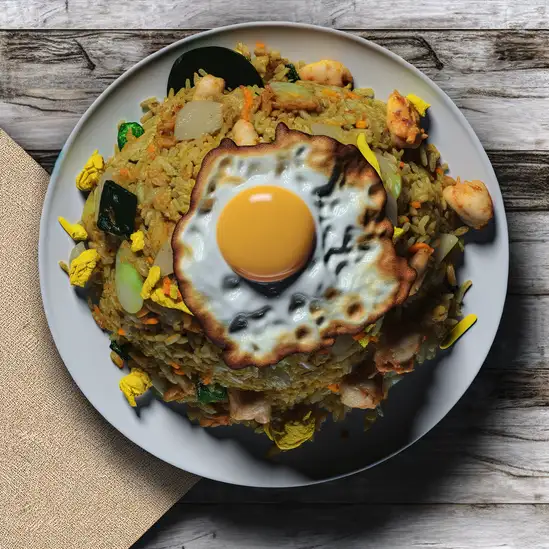
A flavorful fried rice dish often cooked with a mix of spices, vegetables, and proteins like chicken or shrimp, typically served with a fried egg on top.
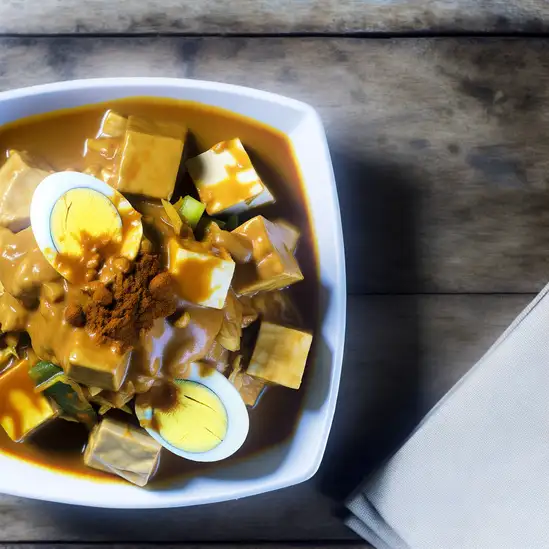
A salad made of boiled vegetables, tofu, and hard-boiled eggs, all topped with a creamy peanut sauce.
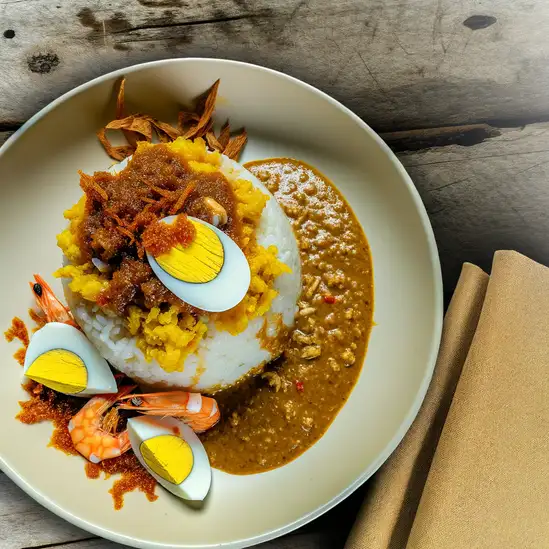
A traditional Betawi omelette made with glutinous rice, eggs, and shredded coconut, often topped with fried shallots and served with a spicy sauce.
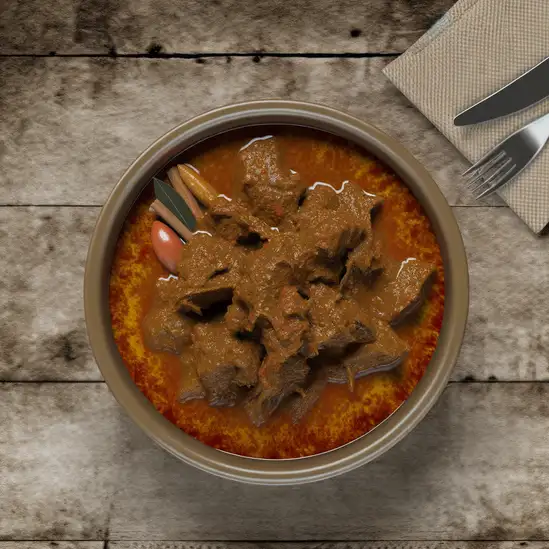
A slow-cooked beef dish in a rich and spicy coconut milk sauce, originating from the Minangkabau ethnic group.
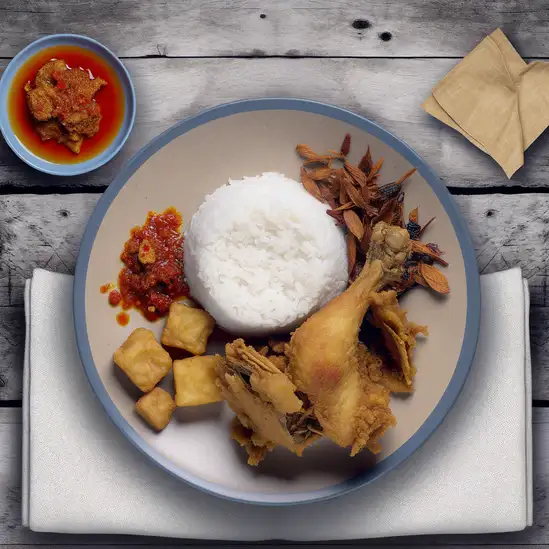
Smashed fried chicken served with sambal (spicy chili paste), fried tofu, tempeh, and rice.

Oxtail soup that is rich and savory, typically served with vegetables and a side of rice.

Skewered and grilled meat, usually served with a rich peanut sauce, rice cakes, and a side of pickled vegetables.

Chicken congee, a savory rice porridge topped with shredded chicken, fried shallots, and a drizzle of soy sauce.
Bali feels like stepping into a vibrant dream where every corner pulses with life and warmth. From the moment you arrive,there’s this unmistakable energy—part spiritual,part playful—that wraps around you like a soft,tropical breeze. Imagine waking up to the gentle rustle of palm leaves and the distant sound of waves crashing against volcanic black sand beaches. The air carries a mix of frangipani blossoms and salty sea spray,instantly grounding you in the island’s natural beauty.
What really makes Bali special is its rich culture woven into everyday life. You’ll see locals in colorful sarongs offering flowers at temple steps,hear the rhythmic beat of gamelan music drifting through the air,and catch glimpses of intricate wood carvings and vibrant paintings in small artisan shops. The island’s spirituality isn’t just something you observe—it’s something you feel,a quiet presence that invites you to slow down and connect.
And then there’s the food—oh,the food! Freshly grilled satay,fragrant nasi campur bursting with spices,and tropical fruits so sweet they almost taste like candy. Whether you’re dining in a bustling market or a cliffside café overlooking the ocean,every bite feels like a celebration of Bali’s rich flavors and traditions. Honestly,Bali isn’t just a place you visit; it’s a place that stays with you,long after you’ve left.
If you ever find yourself wandering through Yogyakarta,you’ll immediately notice a rhythm that feels both lively and laid-back,like the city is humming a gentle,inviting tune. It’s a place where ancient traditions and youthful energy collide in the most beautiful way. As you stroll down Malioboro Street,the air is thick with the scent of sizzling satay and sweet jasmine from roadside stalls,while the chatter of locals bargaining and the distant beat of gamelan music create a vibrant soundtrack. The city’s heart beats in its art and culture—every corner seems to hold a story,from the intricate batik workshops to the majestic temples of Borobudur and Prambanan just a short ride away.
Yogyakarta’s charm lies in its warmth and authenticity. The people here are incredibly welcoming,often eager to share their crafts,stories,or a cup of strong Javanese coffee. You can feel the city’s deep respect for its heritage,yet it’s also a hub for creative souls,with street art splashed across walls and indie cafes buzzing with young artists and thinkers. The sunsets here are something else—casting a golden glow over the terracotta rooftops and ancient palaces,inviting you to pause and soak it all in.
Whether you’re wandering through the Sultan’s Palace,tasting gudeg (a sweet jackfruit stew) at a local warung,or simply watching the world go by from a cozy café,Yogyakarta wraps you in a sense of belonging. It’s a city that doesn’t just ask you to visit but to stay a little longer,to explore deeper,and to fall in love with its soul.
Surabaya pulses with an energy that’s both vibrant and welcoming,a city where history and modern life dance side by side. As you wander through its bustling streets,you’ll catch the scent of sizzling satay mingling with the salty breeze from the nearby harbor. The city hums with the chatter of locals bargaining in lively markets,the clatter of motorbikes weaving through traffic,and the distant call of street vendors selling fresh tropical fruits. It’s a place where every corner tells a story—from colonial-era buildings standing proudly alongside sleek skyscrapers to colorful murals that splash life onto old walls.
What really makes Surabaya special is its character:tough yet warm,a city that’s seen its share of history but never lost its heart. The people here are fiercely proud and incredibly friendly,always ready to share a smile or a recommendation for the best local warung. Dive into the food scene and you’ll find yourself savoring rich,spicy flavors—like the famous rawon,a dark beef soup that’s both comforting and bold,or the sweet,sticky lontong balap that fills the air with fragrant spices.
Evenings in Surabaya have their own magic. The city lights flicker on,and the streets fill with the sounds of gamelan music drifting from cultural performances or the laughter spilling out of cozy cafes. Whether you’re exploring the historic old town or simply sipping kopi on a street corner,Surabaya invites you to slow down,soak in its layers,and feel the heartbeat of a city that’s alive in every sense.
Imagine stepping into a city where the air carries a cool,refreshing breeze,a welcome relief from Indonesia’s usual tropical heat—that’s Bandung for you. Nestled among lush volcanic hills,this city pulses with a laid-back yet vibrant energy. As you wander its streets,you’ll hear the hum of scooters weaving through traffic,the chatter of locals bargaining in bustling markets,and the occasional clink of coffee cups from cozy cafés tucked into leafy corners. Bandung’s charm lies in this blend of nature and urban life,where modern creativity meets traditional Sundanese culture.
The scent of fresh rain mingles with the aroma of roasted coffee beans and sizzling street food,inviting you to slow down and savor the moment. Don’t miss trying the local delicacies—like the warm,comforting batagor (fried fish dumplings) or the sweet,sticky peuyeum (fermented cassava). Each bite tells a story of the city’s rich culinary heritage. Art and fashion lovers will find themselves enchanted by Bandung’s thriving creative scene,from indie boutiques showcasing local designers to vibrant street art splashed across walls.
What really makes Bandung unforgettable is its people—their warmth and easy smiles make you feel instantly at home. Whether you’re exploring the colorful markets,hiking nearby volcanic craters,or simply sipping tea while watching the sunset paint the sky in shades of pink and orange,Bandung invites you to slow down,breathe deeply,and soak in a rhythm that’s uniquely its own.
If you ever find yourself craving a place where the ocean breeze carries the scent of sizzling street food and the hum of lively markets fills the air,Makassar should be at the top of your list. This city pulses with a laid-back energy that feels both vibrant and welcoming,like a friend inviting you to slow down and savor the moment. Walking along the waterfront,you’ll catch glimpses of traditional wooden phinisi boats bobbing gently,their sails catching the golden light of sunset,while fishermen call out to one another in a melodic rhythm that feels timeless.
Makassar’s streets are a feast for the senses. The aroma of grilled seafood—freshly caught and seasoned with local spices—wafts from warungs lining the alleys,tempting you to try coto Makassar,a rich,aromatic beef soup that locals swear by. The city’s mix of Bugis and Makassarese cultures shines through in its colorful markets,where vibrant textiles,handcrafted jewelry,and lively banter create a tapestry of daily life that’s both authentic and inviting.
What really makes Makassar stand out is its blend of old and new. You can explore centuries-old forts and mosques,then hop over to a bustling café where young creatives gather,blending tradition with modern flair. It’s a place where every corner tells a story,and every meal feels like a celebration. Trust me,Makassar isn’t just a stopover—it’s a place that stays with you long after you’ve left.
If you ever find yourself wandering through Kota Medan,you’ll immediately notice its vibrant pulse—a city where tradition and modern life dance together effortlessly. The streets buzz with the chatter of locals,the sizzle of street food stalls,and the occasional call to prayer echoing from nearby mosques. It’s a place that feels alive,warm,and inviting,like an old friend eager to share stories over a cup of kopi Medan,the local coffee that’s rich,bold,and just a little sweet.
Walking through the city,your senses will be treated to a tapestry of aromas:fragrant spices from bustling markets,the smoky hint of grilled satay,and the fresh scent of tropical fruits piled high in colorful stalls. The architecture is a fascinating mix too—colonial-era buildings standing proudly alongside vibrant Chinese temples and bustling shopping streets. This blend reflects Medan’s diverse cultural roots,where Malay,Batak,Chinese,and Indian influences mingle in everyday life.
What really makes Medan special is its people—their warmth and openness make you feel instantly at home. Whether you’re savoring a plate of soto Medan,a comforting coconut milk soup,or exploring the lively Pasar Petisah market,there’s a genuine friendliness that invites you to slow down and soak it all in. It’s a city that doesn’t just welcome you; it wraps you in its rich,flavorful embrace and leaves you wanting to come back for more.
Scammers may install skimming devices on ATMs to steal card information and PINs, which are then used for fraudulent transactions.
Money changers may use confusing rates, hidden fees, or sleight of hand to shortchange tourists during currency exchanges.
Scammers may approach tourists asking for donations to fake charities or causes, often using emotional stories to manipulate them.
Scammers posing as police officers may accuse tourists of minor infractions and demand on-the-spot fines to avoid further trouble.
Scammers posing as tour guides may offer their services to tourists, only to provide little value or demand extra money during the tour.
Tourists renting motorbikes may be accused of damaging the vehicle upon return, with the rental company demanding excessive repair fees.
Tourists may be sold overpriced tickets or tours by unauthorized agents, often with hidden fees or subpar services.
Pickpockets often target crowded areas like markets, public transportation, and tourist attractions to steal wallets, phones, or other valuables.
Street vendors may charge tourists significantly higher prices for food, souvenirs, or other items compared to locals.
Some taxi drivers may refuse to use the meter and charge tourists inflated fares, or take unnecessarily long routes to increase the fare.
The use, possession, and trafficking of drugs are strictly prohibited in Jakarta Pusat and throughout Indonesia. The country has very stringent drug laws, and violations can result in severe penalties, including long prison sentences and even the death penalty for trafficking. Tourists should be extremely cautious and avoid any involvement with illegal drugs.
In Kota Administrasi Jakarta Pusat, smoking is regulated by local and national laws. Smoking is prohibited in public places such as schools, hospitals, public transportation, and government buildings. There are designated smoking areas where smoking is allowed. Violations can result in fines.
Vaping is subject to similar regulations as smoking. It is prohibited in public places and public transportation. Designated vaping areas are available, and violators may face fines. The sale of vaping products is also regulated, and there are age restrictions for purchasing these products.
What are other people saying about Kota Administrasi Jakarta Pusat?
Recent Social posts about Kota Administrasi Jakarta Pusat
There is nothing to show you for now.